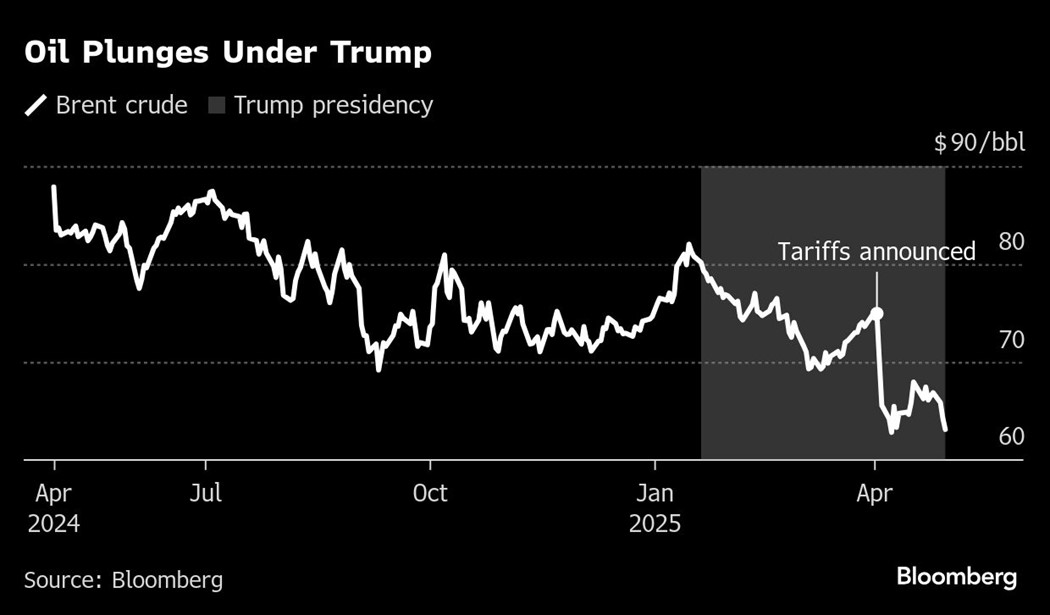Chevron Cuts Buybacks and Exxon Sits Tight as Oil Plunges
May 02, 2025 by Bloomberg(Bloomberg) -- Chevron Corp. will reduce share buybacks this quarter after oil prices tumbled, indicating that President Donald Trump’s trade war is hurting a key US industry he pledged to help.
The Houston-based company said Friday it will repurchase about $2.75 billion of stock in the second quarter, about 30% less than it bought in the first three months of the year. It comes despite Chevron beating earnings estimates on more low-cost production from Kazakhstan and the Permian Basin.

Exxon Mobil Corp., which also reported earnings Friday, is sticking to its plan to buy back about $5 billion in shares per quarter. And Shell Plc said it has the financial wherewithal to keep repurchasing upwards of $3 billion of shares each quarter even if crude plunges as low as $50 a barrel.
Big Oil is finding it increasingly difficult to maintain share buybacks as Brent crude slumped 17% this year to about $62 a barrel at the close Thursday. Trump’s tariffs are poised to slow demand growth for crude and increase the cost of steel and other materials needed to produce oil and gas. At the same time, OPEC and its allies surprised markets last month with a plan to increase oil supplies more than expected later this year.
“Oil prices have changed,” Chief Financial Officer Eimear Bonner said in an interview. “The market, from a supply and demand perspective, appears to be softening.”
Also See: OPEC+ Discusses 400,000-Barrel Production Hike Ahead of Call

The downturn in oil prices is starting to show the relative strength and weakness between the world’s supermajors. BP plc and Chevron cut their buybacks while Exxon, Shell and TotalEnergies SE maintained their payouts. Still, with debt levels rising across the group, it remains to be seen which is the right approach — especially if crude prices continue to decline.
Brent crude futures slipped about 1.6% Friday, to $61.14 a barrel.
Chevron’s adjusted first-quarter earnings of $2.18 a share beat the expectations of analysts. Shell beat earnings estimates, while Exxon matched them.
Chevron’s second-quarter buyback of between $2.5 billion and $3 billion, if maintained for the rest of the year, still fits within its annual guidance of $10 billion to $20 billion.
While it would be a reduction from last year’s payout, Chevron has had an especially ambitious buyback program. It has spent more to repurchase shares, relative to its size, than most of its peers in the industry, shelling out roughly $50 billion over the last three years on the effort.
Plus, the company scooped up about 5% of Hess Corp. shares in the first quarter, a stake worth around $2.3 billion at the time, ahead of the anticipated merger later this year.
“It’s still a very strong program,” Bonner said on a call with analysts. “We’re still buying a significant amount of our shares, and that’s on top of a dividend that’s that’s growing — growing faster than our peers.
Chevron shares rose as much as 2.6% Friday in New York.
Chevron’s debt level, meanwhile, remains healthy. Its net debt radio jumped to 14.4% at the end of the first quarter from 10.4% in the prior period, even before the drop in oil prices last month. But that’s well below the company’s target range of 20% to 25%.
Chevron clearly has the ability to continue pumping cash back to shareholders, RBC Capital Markets analyst Biraj Borkhataria said in a note to clients. But the company’s moves this quarter suggests it’s girding for tough times ahead.
“The reaction from the company today seems to reflect a ‘skate to where the puck is going’ situation, with a recognition that the macro has deteriorated, and could continue to deteriorate further from here,” Borkhataria wrote.

Exxon, the biggest investor-owned supermajor, invested heavily in new projects as others cut back during Covid-19 and plans to do so again through this year’s downturn with annual capital spending set to be higher than last year. The company plans to bring on 10 new projects this year including new oil developments in Guyana, the Permian Basin and Brazil as well as liquefied natural gas along the US Gulf Coast and chemicals in China.
“In this uncertain market, our shareholders can be confident in knowing that we’re built for this,” Chief Executive Officer Darren Woods said in the statement.
Exxon shares fell as much as 1.2%.

Shell’s results are a sign of how Chief Executive Officer Wael Sawan’s focus on cutting costs, improving reliability and shedding under-performing assets has positioned the company to weather an industry downturn, in contrast to local rival BP Plc.
The company’s shares rose 2.1% Friday in London.
Nonetheless, Shell’s cash flow from operations dropped to $9.28 billion in the first quarter, down from $13.16 billion in the prior period. Net debt climbed to $41.52 billion, up from $38.81 billion in the fourth quarter. Gearing, the ratio of net debt to equity, rose from 17.7% to 18.7%.
“We’re just working through our plan and we don’t really change anything,” Chief Financial Officer Sinead Gorman said on a call with journalists. “But I do understand for other companies that can be more difficult when they haven’t positioned quite as well.”
(Adds context regarding Chevron’s buybacks starting in the 10th paragraph.)
©2025 Bloomberg L.P.
By


















